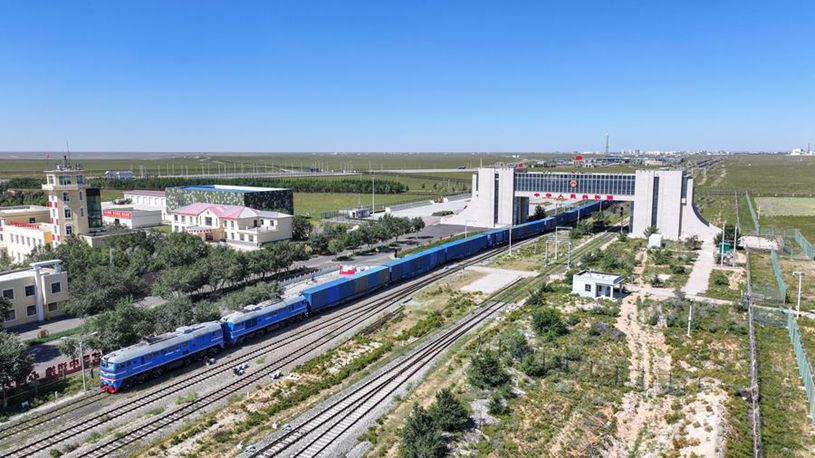Explainer: What comes next after Israel killed PM of Houthi-backed gov't in Yemen?
Source: Xinhua
Editor: huaxia
2025-09-09 02:07:17
by Murad Abdo
ADEN, Yemen, Sept. 8 (Xinhua) -- The confrontation between Israel and Yemen's Houthi group has entered a new phase after an Israeli airstrike on Aug. 28 killed Ahmed al-Rahawi, head of the Houthi-backed government, along with nine of his ministers.
These Houthi officials were reportedly attending a meeting in Sanaa and watching a televised speech by the group's leader, Abdulmalik al-Houthi, on the Gaza war when the Israeli airstrikes occurred. According to a Houthi source, Israeli warplanes launched 10 airstrikes targeting a building in southern Sanaa.
It marked the first time since Israel began striking Yemen in July 2024 that senior Houthi leaders were killed, raising questions about Israel's military strategy, the Houthis' resilience, and the potential for broader regional escalation.
WHAT HAS BEEN THE HOUTHIS' RESPONSE?
Soon after the Israeli strikes, Houthi officials reacted defiantly, vowing to continue supporting Gaza and to strengthen their armed forces.
On Aug. 30, Mahdi al-Mashat, head of the Supreme Political Council, the Houthis' highest governing body in Sanaa, warned in a speech aired by al-Masirah TV that "Israel should await dark days." Defense Minister Mohammed Nasser al-Atifi declared that Houthi forces "are ready at all levels to confront" Israel, while military chief of staff Mohammed Abdulkarim al-Gumari said "the Israeli aggression on civilian sites will not pass without punishment."
On Sept. 1, the Houthi group announced it has targeted and hit Scarlet Ray, an "Israeli-linked" oil tanker in the northern Red Sea. The Yemeni group launched rounds of missiles and drones at Israel in the following days. On Sunday, the Houthis claimed to have sent eight drones toward Negev, Eilat, Ashkelon, Ashdod, and Tel Aviv. One drone struck the arrivals hall of Ramon Airport near Eilat, injuring at least two people and forcing a temporary suspension of air traffic.
Analysts believe the Houthis, who possess a stockpile of missiles and drones capable of striking deep into Israeli territory, are seeking to drag Israel into a prolonged war of attrition.
Another Houthi response to the Israeli strikes has been the detention of UN staff. On Aug. 31, the group detained at least 11 UN staff members in Sanaa and Hodeidah, bringing the total number of UN personnel held in northern Yemen to 34, according to UN Special Envoy Hans Grundberg.
According to media reports, the Houthis have accused the UN employees of espionage on behalf of Israel and the United States.
WILL THE CONFLICT EXPAND?
The deaths of senior civilian officials are unlikely to impact the Houthis' military operations, which are directed by military commanders outside Sanaa. Analysts say the group is expected to continue its attacks on Israeli targets.
"Most of the senior military leaders are based in remote, mountainous areas of northern provinces, making them extremely difficult to reach," Yemeni military expert Ali Bin Hadi said.
The Israeli strikes on senior Houthi officials have fueled speculation over whether they mark the start of a broader campaign against Houthi leaders, potentially unraveling fragile regional understandings and deepening instability.
"Israel risks being pulled into a conflict with no clear exit," said Mohamed Mohsen, a Yemeni political writer. "If the Houthis maintain their attacks, Israel may be forced to commit greater resources while facing a growing security challenge at home."
Analysts also warn that tensions could extend beyond Yemen itself. The Red Sea and the Bab al-Mandab Strait, among the world's busiest maritime routes, are likely to see heightened clashes that threaten international trade.
Further escalation could also draw in Yemeni factions allied with Saudi Arabia and the United Arab Emirates, especially if they receive military or political support from Washington. Such a development risks entangling multiple regional powers in a widening conflict, analysts warn.
The latest tensions also strain the fragile de-escalation arrangement brokered in May between Washington and the Houthis, which had paused clashes in the Red Sea. Any renewed targeting of U.S. vessels could unravel that deal entirely, pulling Washington back into direct confrontation with the Houthis.
Analysts say the escalation underscores a broader reality: The unresolved Israel-Palestine conflict continues to fuel instability far beyond Gaza, drawing new actors into confrontation. ■













Comments